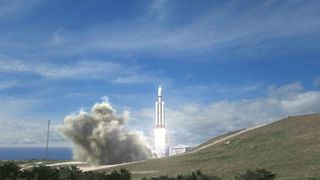
A private spaceflight company is dead serious about taking astronauts to Mars, saying that the very survival of humanity depends on settling other planets.
Space Exploration Technologies — better known as SpaceX — was founded primarily to help humankind establish a lasting presence beyond Earth, according to millionaire entrepreneur Elon Musk, SpaceX's CEO and founder. Such expansion is necessary to safeguard our species over the long haul, he added.
"Ultimately, the thing that is super-important in the grand scale of history is, are we on a path to becoming a multiplanet species or not?" Musk said during a talk Monday (Aug. 1) at a meeting of the American Institute of Aeronautics and Astronautics in San Diego.
"If we're not, well, that's not a very bright future," Musk continued. "We'll simply be hanging out on Earth until some eventual calamity claims us." [Video: Elon Musk on Going to Mars]
Going to Mars
SpaceX is actively working to get people to Mars. Musk has said he hopes to send astronauts to the Red Planet within 10 or 20 years — up to 15 years earlier than NASA plans to put boots on the ground there.

Astronauts could make the nine-month trip to Mars in the company's Dragon capsule, which SpaceX is developing to deliver cargo and crew to the International Space Station, according to Musk. And SpaceX is also working on a heavy-lift rocket, called the Falcon Heavy, which could blast Dragon or other craft toward the Red Planet. [The Falcon and Dragons of SpaceX]
Get the Space.com Newsletter
Breaking space news, the latest updates on rocket launches, skywatching events and more!
Dragon has already made one test flight, during which it launched unmanned, orbited Earth twice and splashed down in the Pacific Ocean. The Falcon Heavy may fly for the first time by late 2012 or early 2013, Musk has said.
Of course, just getting a handful of people to the Red Planet is a far cry from setting up permanent human settlements there — which is what Musk wants to help make happen.
"That's kind of how I'm judging SpaceX," said Musk, who also founded the company and serves as its chief technology officer. "Are we helping move things in that direction?"
Making spaceflight cheaper
Colonizing Mars would require ferrying hundreds of thousands of people and millions of tons of cargo there, Musk said.
That would mean a lot of flights, and that's not feasible with today's rockets. They're just too expensive, lofting payloads at a cost of several thousand dollars per pound or more. To make a long-lasting Mars settlement a real possibility, those launch costs will have to come way down, to $50 or $100 per pound, Musk said.
Significant breakthroughs are needed to make spaceflight that cheap. Chief among them is creating a reusable rocket, Musk said. But it's not going to be easy.
"There's a reason that nobody has invented a fully reusable rocket before," Musk said. "It's super damn hard."
Still, Musk expressed optimism that it can be done. In fact, he added, SpaceX has some solid ideas about how to make it happen.
"I think we've got something that on paper closes, and we'll see if that turns out to be reality as well," Musk said.
Science missions, too
While a human colony on Mars may be a long way off, SpaceX is actively planning an unmanned trip that could get to the Red Planet much sooner.
The company is working with NASA on a mission to look for signs of life on Mars. On this so-called "Red Dragon" mission, NASA science hardware would travel to Mars aboard a Dragon capsule, keeping costs down to $400 million or less, excluding the launch vehicle.
Red Dragon could launch toward Mars by 2018, NASA researchers have said.
And the NASA-SpaceX science partnership could extend even farther into the solar system, Musk announced Monday.
"We're talking to NASA about some potential missions that go out to 150 or 200 A.U. [astronomical units] — sort of way out, past Pluto and stuff," Musk said.
You can follow SPACE.com senior writer Mike Wall on Twitter: @michaeldwall. Follow SPACE.com for the latest in space science and exploration news on Twitter @Spacedotcom and on Facebook.
Join our Space Forums to keep talking space on the latest missions, night sky and more! And if you have a news tip, correction or comment, let us know at: community@space.com.

Michael Wall is a Senior Space Writer with Space.com and joined the team in 2010. He primarily covers exoplanets, spaceflight and military space, but has been known to dabble in the space art beat. His book about the search for alien life, "Out There," was published on Nov. 13, 2018. Before becoming a science writer, Michael worked as a herpetologist and wildlife biologist. He has a Ph.D. in evolutionary biology from the University of Sydney, Australia, a bachelor's degree from the University of Arizona, and a graduate certificate in science writing from the University of California, Santa Cruz. To find out what his latest project is, you can follow Michael on Twitter.